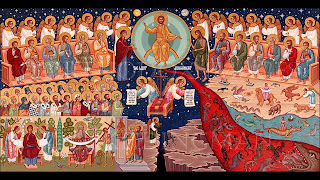
St. Augustin describes how generous our Lord is in offering us eternal rewards in exchange for giving Him comparatively insignificant acts of kindness in the people of the poor, sick, and imprisoned.
He says, “And what have I received, and what do I repay? 'I was an hungred,' He says, 'and you gave Me meat;' and the rest. I received earth, I will give heaven; I received temporal things, I will restore eternal; I received bread, I will give life. Yea, we may even say thus, I have received bread, I will give Bread; I have received drink, I will give Drink; I have received houseroom, I will give a House; I was visited in sickness, I will give Health; I was visited in prison, I will give Liberty. The bread which you gave to My poor is consumed; the Bread which I will give both recruits the failing and does not fail. May He then give us Bread, He who is the living Bread which came down from heaven. When He shall give Bread, He will give Himself. For what did you intend when you lent on usury? To give money, and to receive money; but to give a smaller sum, and to receive a larger. I, says God, will give you an exchange for the better for all that you have given Me. For if you were to give a pound of silver, and to receive a pound of gold, with how great joy would you be possessed? Examine and question avarice. I have given a pound of silver; I receive a pound of gold! What proportion is there between silver and gold! Much more then, what proportion is there between earth and heaven! And your silver and gold you were to leave here below; whereas you will not abide yourself for ever here. And I will give you something else, and I will give you something more, and I will give you something better; I will give you even that which will last forever. So then, Brethren, be our avarice restrained, that another, which is holy, may be enkindled. Evil altogether is her counsel, who hinders you from doing good. You are willing to serve an evil mistress, not owning a Good Lord. And sometimes two mistresses occupy the heart, and tear the slave asunder who deserves to be in slavery to such a double yoke. Yes, sometimes two opposing mistresses have possession of a man, avarice and luxuriousness. Avarice says, ‘Keep;’ luxuriousness, says, ‘Spend.’ Under two mistresses bidding and exacting diverse things what can you do?”
He then warns about how these two sins hinder us from trusting in our Lord and receiving heavenly rewards for earthly deposits.
Avarice tells us to “keep for yourself, consult for the future.” When we look at examples of people that have tried to preserve their wealth until a good old age or as a possession to pass on to their children, we see how most times things do not go as planned due to unexpected misfortunes or ungrateful children that are not benefited from such inheritances.
Our Lord wisely offers the same counsel as Avarice that we should “keep for ourselves and consult for our future.” We must keep for ourselves treasures in Heaven and consult for our future by preparing for eternity by being worthy of entering into the Kingdom of Heaven.
Luxuriousness tells us, “Do well to thine own soul, spend as freely as you can.” Our Lord shared the accounts of the rich man that spurned the beggar Lazarus and the rich man that wanted to build larger barns to show us the results of those that chose to only do well to their own souls. Both men had terrible ends in torments, both men having had their rewards in their earthly lives.
Our Lord once again uses the same words, but with different meaning saying, “Do well to thine own soul, spend as freely as you can” We do so by almsgiving, knowing that our reward will be in the Heavens that will last for eternity.
We are blessed to live in a time after our Lord’s Resurrection and after so many Saints of the Church to have been instructed and given Grace to do God’s will.
Unfortunately, our Lord has prophesied that even with these great advantages, evil will one day reach a height that people will worship and obey the Antichrist. This will bring about the second coming of Christ when He will come with great power to “cut off the incurable from the healthy like rotting limbs and deliver them into the fire, but His own He will rescue from the spiteful abuse of evil men and from contact with them, and will make them heirs of the kingdom of Heaven.” (Gregory Palamas)
So let us not be afraid to give of ourselves in fear of becoming poor, for we will hear Christ say to us, “Come, ye blessed of my Father, inherit the kingdom.” Rather let us be afraid of not showing love to God by our lack of compassion and hear the dreadful sentence of condemnation.
If we focus on what rich blessings our patient, loving Lord gives us in exchange for such small temporary acts of love, we will be strengthened and inspired to “attain this by the grace and love for mankind of our Lord Jesus Christ, to whom, together with the Father and the Holy Spirit, be honor and glory unto the ages of ages. Amen.” (Gregory Palamas)
